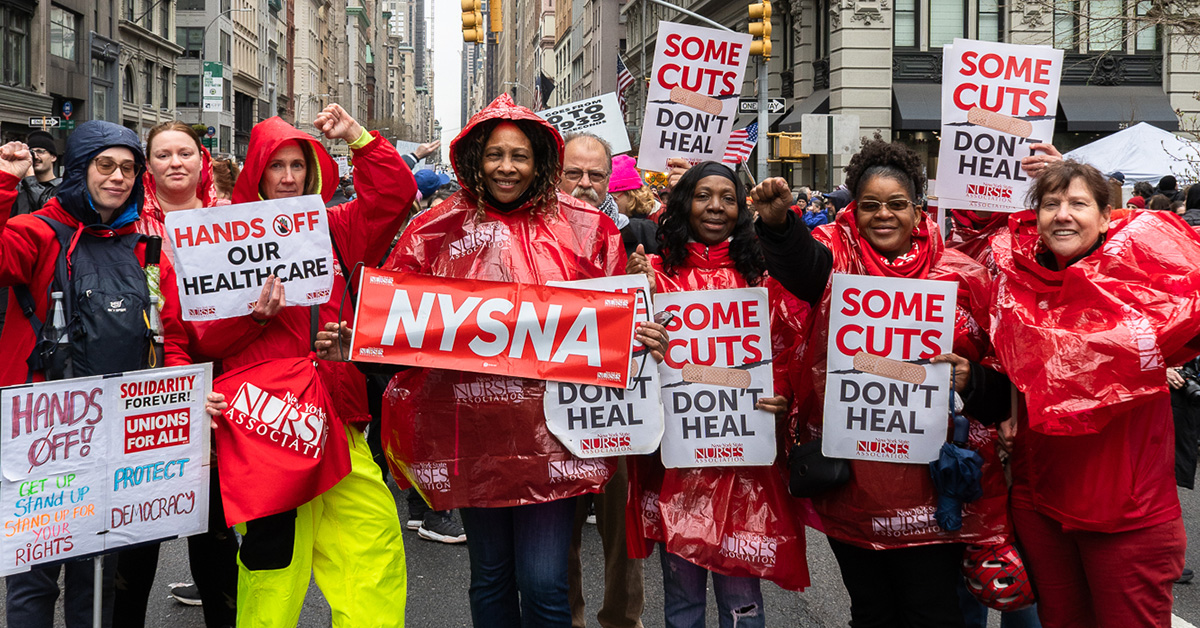New York nurses fight to stop Medicaid cuts

Staff report
National Nurse magazine - April | May | June 2025 Issue
Frontline nurses know that Medicaid saves lives. One in 3 adults and almost half of all children in New York rely on Medicaid, and Medicaid funds nearly half of all births. Many hospitals throughout the state receive most of their revenue from Medicaid.
In May, the U.S. House of Representatives approved a bill that includes tax cuts for the richest Americans while cutting nearly $1 trillion from health care, including Medicaid. The Senate still has a chance to make modifications to the House version of the bill. But as it stands, the bill decimates funding for Medicaid, a lifesaving program, and places our patients — including some of the most vulnerable New Yorkers — in danger of losing access to health care. The nonpartisan Congressional Budget Office estimates that 16 million people will lose health care coverage due to cuts to Medicaid, Medicare, and the Affordable Care Act (ACA). It’s also probable that such deep cuts will cause entire hospitals to close, laying off thousands of nurses and health care workers.
The bill, as it currently stands, will strip health care coverage from more than 1 million New Yorkers, deprive our state of $13.5 billion in federal funding annually, and increase health care costs overall.
- Low-income adults, seniors, children, people with disabilities, and legal residents will lose health care coverage
- Burdensome work requirements and bureaucratic red tape will further restrict ACA and Essential Plan health insurance eligibility
- Struggling health care facilities throughout the state will lose federal funding
- Premiums will increase by an average of 50 percent for patients who buy coverage on the ACA exchange
- The Fiscal Policy Institute estimates New York state alone will lose 79,000 health care jobs.
Saying that Medicaid is a lifesaving program isn’t hyperbole. A recent study that the National Bureau of Economic Research conducted found that the expansion of Medicaid has saved more than 27,000 lives since 2010. These findings confirm what nurses have been saying at every available opportunity, and they explain why we’ve been fighting these cuts at every turn.
In April, New York State Nurses Association joined National Nurses United on Capitol Hill to directly lobby Congress to reject any budget that includes Medicaid cuts and to reintroduce Medicare for All legislation. Nurses have hit the streets. They attended the “Hands Off” rallies in Buffalo, Albany, Westchester, and New York City on April 5. Nurses took to the streets in Albany and New York City on International Workers Day (May 1). Throughout May, they joined with 1199SEIU to speak out and demand answers from members of Congress in their districts — from Dunkirk to Peekskill to Plattsburgh to Bay Shore. And in May and June, nurses gathered several times in Tarrytown, Melville, and Manhattan to phone bank members of Congress to stop the cuts.
NYSNA nurses have also been featured in national media calling on representatives to do the right thing and reject extreme budget cuts to line billionaires’ pockets. In April, USA Today published an opinion editorial by NYSNA President Nancy Hagans, RN, where Hagans echoed the National Bureau of Economic Research study’s conclusions. “Cuts to our nation’s public service programs are premature death sentences for many of our nation’s patients. As an ICU nurse of more than 30 years at a safety net hospital in Brooklyn, New York, I know this to be true,” she said in defense of Medicaid and Social Security.
The bill is not a done deal. The Senate still has to vote, and nurses and health care workers can still pressure Congress to make changes. Until both chambers of Congress pass the bill and the president signs it into law, nurses and health care workers still have a chance to speak up and fight for their patients. Nurses are patient advocates, and their voices matter.
Stay tuned for upcoming actions to push our elected officials to do the right thing. Nurses cannot back down from this fight. We must protect Medicaid! Our patients’ lives depend on it.